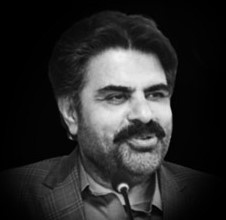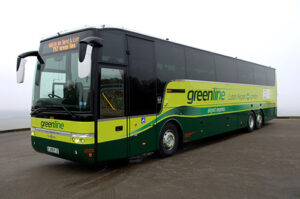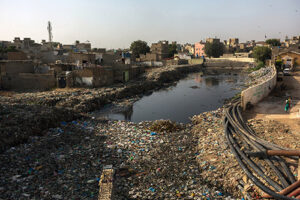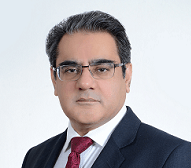
Sindh Minister for Information & Local Bodies
The Pakistan People’s Party (PPP) has been in power in Sindh for the past 13 years, but their tenure is
being cited as “the perfect example of poor governance and mismanagement” not just by political rivals, but also by many members of civil society. The Karachi-based political parties, in particular, accuse the Sindh Government of discrimination against the city – a charge vehemently denied by the PPP.
The PPP’s top leaders maintain that the provincial government is the target of a vicious and unjust propaganda campaign, as it grapples with the massive challenges posed by a mega-city like Karachi.
Syed Nasir Hussain Shah, PPP’s soft-spoken Minister for Local Bodies and Information in Sindh, responds to critical questions on the PPP government’s “faltering” performance in the province in his unprovocative and easy-going style.
Why, across Pakistan, is this perception so strong that the Sindh Government has not served urban Sindh well, especially Karachi?
This is only a perception, not the reality. The Pakistan People’s Party has done a lot of work. Our Chairman, Bilawal Bhutto Zardari, has given the Sindh Government a vision for the development of this city and has directed the chief minister and his cabinet members to keep a special focus on Karachi’s development. A lot of work has been done. In fact, all the mega projects in Karachi have been launched and completed during PPP’s tenure – from the days of Prime Minister Zulfikar Ali Bhutto to those of Mohtarama Benazir Bhutto – and this tradition has continued from 2008 onwards.
There are allegations that the Sindh provincial government does not support the local government or the KMC (Karachi Metropolitan Corporation). This is not true. The Sindh Government gives 50 core (500 million) rupees monthly to support the KMC. A lot of work is being done for the improvement of the city’s infrastructure, but Karachi is a huge city and the Sindh Government alone cannot raise the amount recommended by the World Bank and other international agencies. Successive governments at the centre just make tall promises, but they hardly deliver. The PPP is trying to deliver as Mr. Zardari has also asked us to focus on Karachi. However, there is a vicious propaganda campaign being carried out against the PPP. During the previous government of Mian Nawaz Sharif, it was alleged that the Green Line (a public transport artery) was ready, and that the Sindh Government was not keeping its part of the deal by failing to purchase public buses. But the truth is that the Green Line project remains incomplete to this day and we are being made the target of baseless allegations.

Over the last one-and-a half year, roads and underpasses are being built in Karachi at a rapid pace. Development work is being carried out even in those areas which are not represented by the PPP in the local bodies, and at the provincial and national level. Yet, the PPP is giving funds to all the areas as we do not believe in the rural-urban divide or ethnicity.

Unfortunately, Karachi is one of those cities where the quality of life has deteriorated. A World Bank 2018 report ranked Karachi among one of the most unlivable cities in the world. Why has the PPP not been able to make a difference despite ruling for the last 13 years?
Karachi poses a huge challenge. There is a lot of migration to Karachi from all over the country. Most people from other provinces come here not for tourism or a simple visit, but to settle here, which puts a lot of burden on the already stressed resources of this city. The World Bank report is in reference to the kutchi abadis (slums), and the provincial government is working to improve these illegal settlements. The Sindh Government has secured two loans from the World Bank — the first of 72 million dollars, signed by Saeed Ghani — and the other a 100-million dollar plus loan — specially to improve water supply, sewerage lines and the performance of the KMC and the DMCs (District Municipal Corporations).
Why did we sign two loan agreements just for Karachi and not for any other city?
Because we give importance to our provincial capital, which is the financial and industrial hub of Pakistan. The tranches of these loans are already being disbursed and as a result, improvements are being made.
Another positive development is the formation of a committee to look after Karachi’s affairs. All the stakeholders – the provincial and the federal governments and the relevant institutions – are part of this committee, which is helping us to implement decisions smoothly. Big chunks of lands in Karachi belong to the federal government – Pakistan Railways, the Karachi Port Trust, the Defence Housing Authority and the Cantonments – and do not come under the Sindh government. Therefore, the coordination done under the umbrella of this committee is of great help.
In your view, what are the pressing issues of Karachi, in terms of priority?
The biggest issue is water. Karachi has two water sources – the Dhabeji Lake and Hub Dam – which are located outside the city. Immigration to Karachi from other parts of the country is also posing a challenge. The new arrivals need basic amenities, including water. But Sindh is not getting its due share. The federal government has to release extra water to Karachi as we are absorbing a lot of immigrants. Sindh Chief Minister Syed Murad Ali Shah keeps raising this issue in the CCI (Council of Common Interest) meetings, but he is not getting enough support there.
Then, we need to pay immediate attention to the sewerage and water supply lines, many of which are more than 70 years old. These lines need to be replaced, but this requires massive funding.
The centralised Solid Waste Management Board has helped improve garbage collection. Initially only two districts were part of it, but now its ambit is being widened.
What is stopping the PPP from making an effort to turnaround Karachi, improve its infrastructure and governance, as was done by the PML-N government in Lahore?
In Punjab, 70 to 80 percent of the provincial budget was being spent on Lahore. Then, the federal government also diverted a lot of development funds from its quota towards Lahore. But Karachi, despite being the backbone of Pakistan’s economy, was never bestowed with such favours by the PML-N government. Our rivals say that now, after the 18th Amendment, the province will have to take care of all the development work themselves. But when the federal government has development funds, Karachi should also have a right to them.
What is the status of the Karachi Package?
One positive aspect of the Karachi Package is the formation of a committee, in which all the stakeholders are represented. For example, if we are laying down a pipeline from Dhabeji, a portion of which has to pass through the sea, the concerned federal agency will not create hurdles, as used to happen in the past. Another example is Shahra-e-Faisal, which passes through the Cantonment areas. Now that the Corps Commander Karachi and the GOC are members of the Committee, it has become easier to carry out coordinated work on its repair and ensure that this main traffic artery of the city does not get choked by rain water.
The honourable Chief Justices of the Sindh High Court and the Supreme Court of Pakistan have also taken a special interest in Karachi. Consequently the lower courts are not handing down stay orders when we move against encroachments.
However, so far whatever money is being spent is being given by the Sindh Government. Recently, the NDMA (National Disaster Management Authority) funds have also been released; this is taking care of those people whose homes are being bulldozed in the anti-encroachment drives.
Why has a basic problem like solid waste management become such a big issue?
Solid waste management is the responsibility of the DMCs. But they weren’t working properly. So we created a separate organisation, as is the case in other big cities of the world. Now solid waste is being properly disposed of in the landfill sites. In the past, in the absence of a centralised authority, one DMC would lift solid waste from its locality and dispose it off in some other locality, often times throwing it in a nullah. That is the reason why Karachi’s nullah’s remain choked. Even if they are cleared of solid waste, the piles of solid waste reappear within three to four days blocking the nullahs once again.
On another note, Sindh’s stray dogs have become an embarrassment for the PPP government. One never witnessed such a high number of dog bite cases as are being reported now?
While I believe that not even one dog bite case should occur, I have to say that the cases in Sindh are getting special attention from the media. Similar cases in the Punjab, for example, are never highlighted. However, this does not mean that we are not paying heed to this problem. Culling is one way dealing of with it, but then civil society raises a hue and cry. Now dogs are also being neutered with the help of civil society and a new department is focusing on this issue. However, the import of dog bite vaccine is the responsibility of the federal government. At one point there was a shortage of this vaccine, but not so anymore.
What are you views on devolution and empowering the local government?
Chairman Bilawal Bhutto has directed us to empower the local government. The chief minister has formed a committee, which includes, besides myself, Murtaza Wahab, Saeed Ghani and other experts. We are working on it.
Do you have a roadmap for Karachi that would reassure its long-suffering citizens?
A master plan to modernise and develop Karachi is being prepared. A lot of work is being done in this regard, and the citizens of Karachi will soon hear some good news on this front.

The writer is a senior journalist and managing editor, Narratives.



